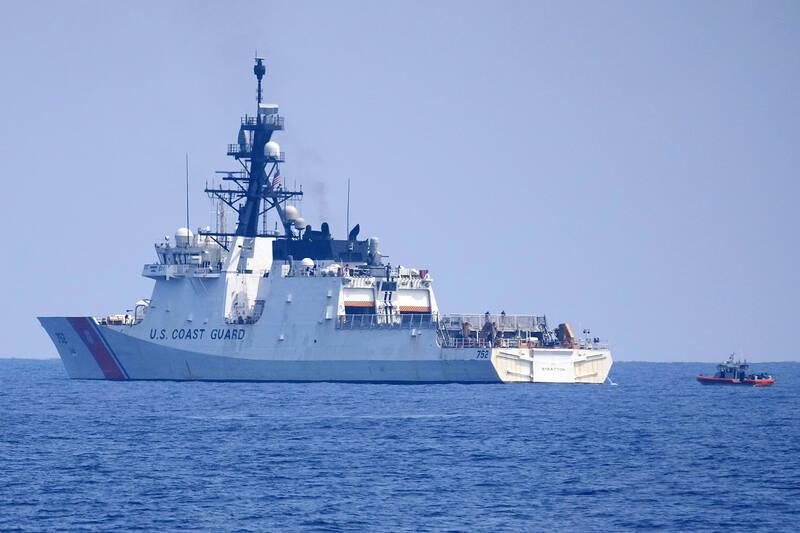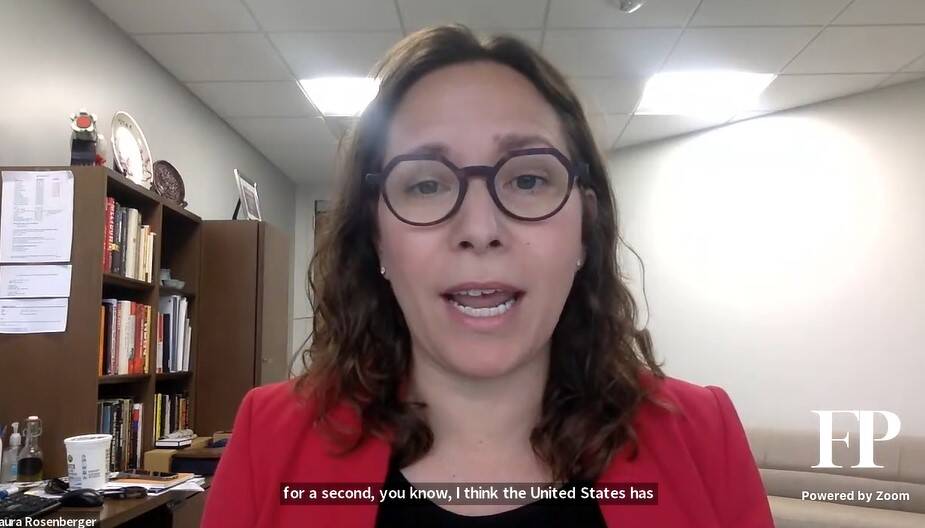A US Coast Guard ship sailed through the Taiwan Strait on Tuesday, a day after US Secretary of State Antony Blinken ended a high-profile visit to Beijing, the US Navy’s 7th Fleet said yesterday.
The national security cutter Stratton made a “routine” Taiwan Strait transit on Tuesday “through waters where high-seas freedoms of navigation and overflight apply in accordance with international law,” the fleet said in a statement.
“Stratton’s transit through the Taiwan Strait demonstrates the United States’ commitment to a free and open Indo-Pacific,” it said. “The United States military flies, sails and operates anywhere international law allows.”

Photo: AP
The mission took place the day after Blinken ended a visit to Beijing, in which the two countries agreed to stabilize their rivalry so it does not veer into conflict, but failed to produce any major breakthrough.
The Ministry of National Defense said the ship sailed in a northerly direction, and its forces monitored the situation, which it described as “normal.”
The Chinese Coast Guard described the ship’s transit as “public hype.”

Photo: screengrab from FP website
Chinese vessels tailed the US ship “all the way,” a Chinese Coast Guard spokesperson said in a statement, adding that China would “resolutely” safeguard its sovereignty, security, and maritime rights and interests.
A security source told Reuters that the US ship left the Strait in the early hours of yesterday morning.
The ministry said that on Wednesday, Chinese warships led by the Shandong aircraft carrier sailed through the Strait.
Separately, Italian patrol vessel Francesco Morosini yesterday made a stop at a US naval base in Yokosuka, Japan, in a display of Italian commitment to the Indo-Pacific region, Italian news site Le Formiche reported.
It is the first time the vessel has participated in US-led training in the region, it reported, adding that the intention is to maintain the “status quo” in the Taiwan Strait.
The Italian aircraft carrier Cavour is also scheduled to participate in exercises in the region next year.
In related news, American Institute in Taiwan Chair Laura Rosenberger yesterday said that peace and stability in the Taiwan Strait is a matter of international concern and an “orienting principle” for the US, as well as of increasing importance in Europe.
Rosenberger made the comments at a virtual dialogue entitled, “Tensions Beyond the Taiwan Strait” hosted by Foreign Policy in partnership with the Wilfried Martens Centre for European Studies.
“Peace and stability in the area are in the political, security and economic interests of the United States, and are matters of international concern,” Rosenberger said, quoting the US’ Taiwan Relations Act.
This perspective has been increasingly shared across the Atlantic and globally over the past few years, as leaders realize the critical role Taiwan plays as a “beacon of democracy” in the region and around the world, she said.
This was highlighted in the early days of the COVID-19 pandemic, when Taiwan showed how countries can harness technology to manage the pandemic in ways that align with democratic principles, she said.
These countries are realizing the critical role that Taiwan plays as a large free-market economy, Rosenberger added.
The semiconductor supply chain crunch felt during the pandemic “is something that really brought home to people the ways in which Taiwan ... plays an essential role in our technology ecosystem,” she said.
There has also been an increased understanding of the role the waters around Taiwan play in maritime shipping, and the consequences if they are threatened by China, she said.
“All of these things point to why Taiwan matters, and really raises its profile and the focus we see from many of our European partners on Taiwan,” she added.
“For so many European countries, the values agenda is really important” in their support for Taiwan, even more so since Russia’s invasion of Ukraine, Rosenberger said, adding that it is also important to understand why Taiwan matters in its own right.
Additional reporting by CNA

AIR SUPPORT: The Ministry of National Defense thanked the US for the delivery, adding that it was an indicator of the White House’s commitment to the Taiwan Relations Act Deputy Minister of National Defense Po Horng-huei (柏鴻輝) and Representative to the US Alexander Yui on Friday attended a delivery ceremony for the first of Taiwan’s long-awaited 66 F-16C/D Block 70 jets at a Lockheed Martin Corp factory in Greenville, South Carolina. “We are so proud to be the global home of the F-16 and to support Taiwan’s air defense capabilities,” US Representative William Timmons wrote on X, alongside a photograph of Taiwanese and US officials at the event. The F-16C/D Block 70 jets Taiwan ordered have the same capabilities as aircraft that had been upgraded to F-16Vs. The batch of Lockheed Martin

GRIDLOCK: The National Fire Agency’s Special Search and Rescue team is on standby to travel to the countries to help out with the rescue effort A powerful earthquake rocked Myanmar and neighboring Thailand yesterday, killing at least three people in Bangkok and burying dozens when a high-rise building under construction collapsed. Footage shared on social media from Myanmar’s second-largest city showed widespread destruction, raising fears that many were trapped under the rubble or killed. The magnitude 7.7 earthquake, with an epicenter near Mandalay in Myanmar, struck at midday and was followed by a strong magnitude 6.4 aftershock. The extent of death, injury and destruction — especially in Myanmar, which is embroiled in a civil war and where information is tightly controlled at the best of times —

Taiwan was ranked the fourth-safest country in the world with a score of 82.9, trailing only Andorra, the United Arab Emirates and Qatar in Numbeo’s Safety Index by Country report. Taiwan’s score improved by 0.1 points compared with last year’s mid-year report, which had Taiwan fourth with a score of 82.8. However, both scores were lower than in last year’s first review, when Taiwan scored 83.3, and are a long way from when Taiwan was named the second-safest country in the world in 2021, scoring 84.8. Taiwan ranked higher than Singapore in ninth with a score of 77.4 and Japan in 10th with

SECURITY RISK: If there is a conflict between China and Taiwan, ‘there would likely be significant consequences to global economic and security interests,’ it said China remains the top military and cyber threat to the US and continues to make progress on capabilities to seize Taiwan, a report by US intelligence agencies said on Tuesday. The report provides an overview of the “collective insights” of top US intelligence agencies about the security threats to the US posed by foreign nations and criminal organizations. In its Annual Threat Assessment, the agencies divided threats facing the US into two broad categories, “nonstate transnational criminals and terrorists” and “major state actors,” with China, Russia, Iran and North Korea named. Of those countries, “China presents the most comprehensive and robust military threat